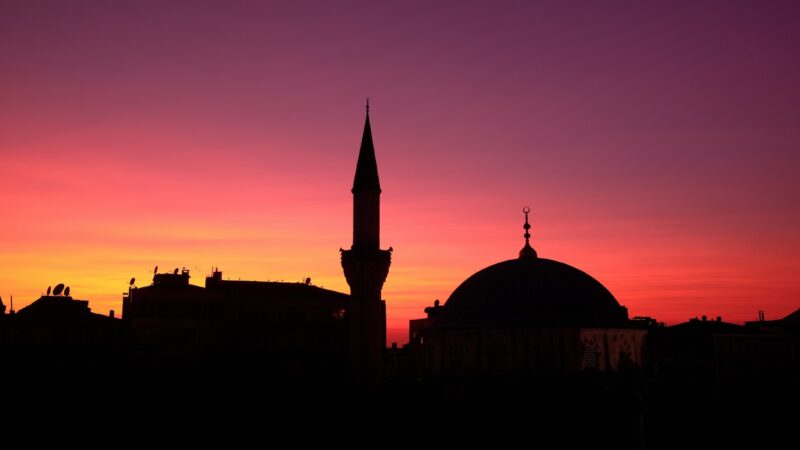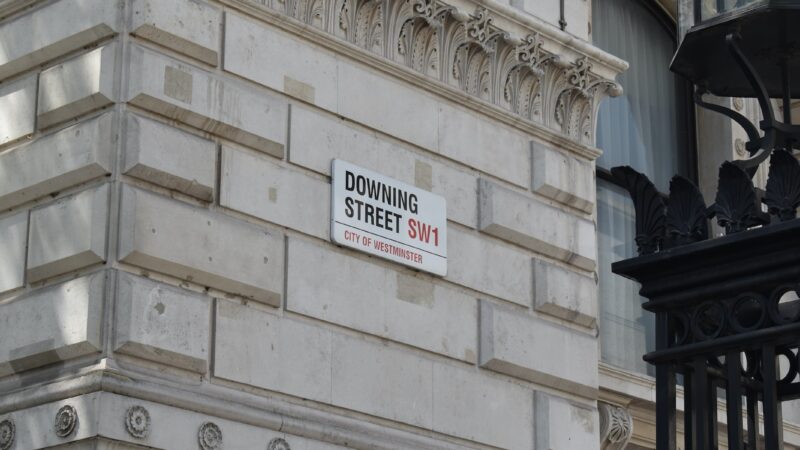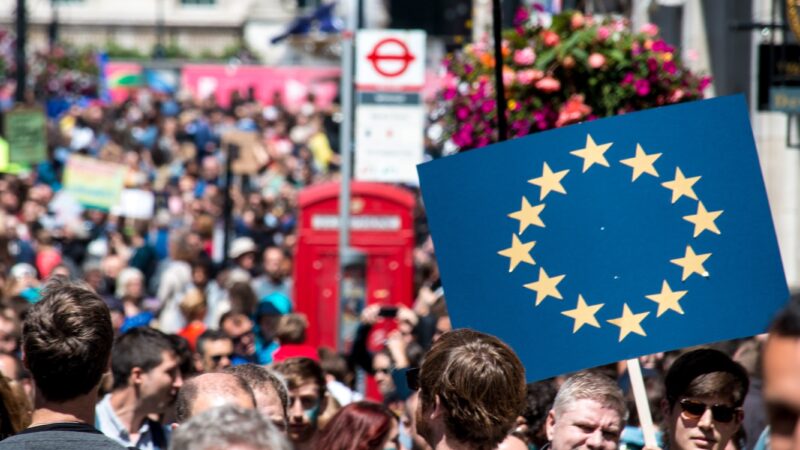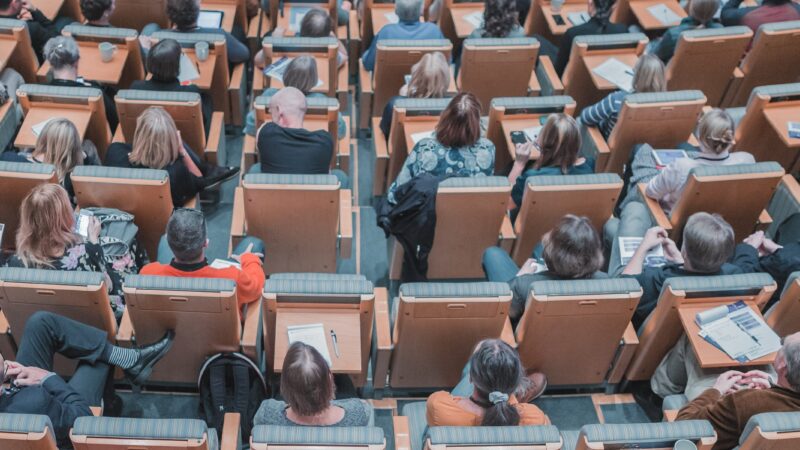It’s Not Just Any Christmas, It’s a Little Shop of Horrors Christmas
What is Christmasy about setting fire to Christmas cards? What is festive about a giant Venus flytrap almost eating a small dog? Nothing, but apparently those are the kinds of Christmases two of the largest high-end retailers are trying to sell us, and we aren’t buying.
The release of Christmas ads in November launches the holiday season, and there are few greater British traditions than gathering around the kettle in the work kitchen to talk about the new John Lewis advert the day after it’s aired.
But the first major retailer to release its ad did not get the reaction it had hoped for. Marks & Spencer faced a backlash over its ‘Love Thismas, Not Thatmas’ ad, which sent the message that traditional Christmas needs to be burnt down, shredded, smashed, and go swimming with the fishes.
In one scene of the retailer’s clothing and home campaign, Sophie Ellis-Bextor turns her attention from browning marshmallows on a gingerbread house with a kitchen blowtorch to setting a stack of Christmas cards on fire. In another, paper hats get mulched into confetti, an elf gets launched off the roof of a house with a baseball bat – you get the idea.
It ends with the voiceover saying: ‘This Christmas, do anything you love.’
‘Do anything you love.’ Eschew the spirit of charity. Destroy Christmas and make it all about you. Not about family. Not about children. Reject tradition.
The John Lewis ad was worse. If the Little Shop of Horrors did Christmas ads, it would look like this.
In short, a boy’s Christmas tree seed grows into a giant voracious Venus flytrap with multiple sharp-toothed mouths, that at one point appears to snap after the family’s Pomeranian. Fearful of the carnivorous plant, the boy’s mother, grandmother, and sister take it outside.
But the narrative that you shouldn’t judge a predatory plant based on its natural inclination triumphs when the family joins the flytrap in the garden with their presents. And as if taking inspiration from the feverish delusions of a sick toddler, the ad ends with the plant snatching the wrapped gifts, gobbling at them, and spitting them back at the family, unwrapped.
John Lewis’s message is spelt out and very much the same as M&S: reject tradition. Or as the major retailer phrased it, the ad “celebrates the joy in the UK’s changing Christmas traditions.”
At one time, John Lewis set the standard for Christmas ads. Memorable favourites like Monty the Penguin (2014), the 2010 montage ad accompanied to Ellie Goulding’s rendition of ‘Your Song’, or the adventurous snowman ad of 2012, were warm, festive, and at times tear-jerking. They celebrated dreaming and childlike innocence. They felt like they were produced with true love for the season. While not all were cookie-cutter traditionally Christmasy in appearance, they conveyed those timeless values of family, sharing, hope, and gratitude. They were crafted with the skill of Don Draper.
The 2023 John Lewis ad is ugly nightmare fodder.
The affordable food retailers, however, embraced and celebrated the traditional messages of Christmas.
Asda leans enthusiastically into the festive season with its joyful, light-hearted ‘Make This Christmas Incredibublé’ ad, featuring Michael Bublé as a store quality officer.
Showing off turkey, mince pies, panettone, and enough cheeses to put a lactose intolerant into a coma, Bublé is funny and ostentatious. The sets are tastefully but festively decorated, and the ad is finished with the singer joining a choir of staff in an energetic rendition of ‘Walking in a Winter Wonderland’.
Asda struck the right chord and knew its audience. It knows they’re suffering under the cost-of-living crisis and says without saying: you can still afford to have a nice Christmas dinner this year.
The Aldi advert sees a return of Kevin the Carrot, this time in his adventures in a Christmas food-themed Willy Wonka’s factory. Narrated by British actor Jim Broadbent, lines of poetry convey deep-rooted values such as: ‘Only Kevin the carrot clearly understood the true meaning of Christmas and the importance of being good.’
And: ‘The season of goodwill was truly in the air, for Christmas is a time that’s sweeter when you share.’
But it was fellow German food retailer Lidl that stole the paper Christmas crown. A racoon who loves Christmas goes on a little hero’s journey to make sure a toy monkey gets delivered to the boy who he’s been watching through the window. While never discovered to be the creature that placed the toy under the tree, the raccoon is rewarded when the family dog takes a portion of Christmas dinner outside to share with him.
It was old John Lewis: full of innocence, adventure, mild peril, and generosity. It was moving and warm. It shared an important message: little gestures of kindness matter.
And the latter two retailers put their money where their mouth is: both Aldi and Lidl are part of the Neighbourly charity network to distribute unsold surplus food to local communities. Lidl is also hosting toy banks for donations in their stores and has said that it will be producing the monkey and raccoon toys for sale, with the proceeds going to Neighbourly.
These aren’t just empty words, but action. The desire to help comes through these ads and touches people. These are authentic expressions of the season of good will towards all men.
What I and people who took issue with in the M&S and John Lewis ads is not that some individuals reject traditional Christmas. People are free to have whatever unconventional Christmases they want and not be judged for it.
No, this is about people tired of being nudged by forces that shape our society and craft our media that our world must change. That even though we are in the majority, we must have our expression of our culture and tradition come second – or not at all – to unconventionality, modernity, and progression.
‘Don’t touch or break our Christmases,’ we’re saying.
These messages from John Lewis and Marks & Spencer were intentional, crafted by professional agencies that have been captured and work to serve the woke agenda and their ‘purpose-driven’ campaigns – sometimes at the expense of profit. While unconventional unChristmas ads are not woke in themselves, they originate from the same spiteful anti-tradition place.
But the fickle monster you feed eventually comes back to bite you over any perceived form of ‘hate’, slight, or microaggression. Case in point: Marks & Spencer had shared a still outtake from their ad to social media, showing paper hats burning in a fireplace, before quickly deleting it and apologising for any offence caused.
Not apologising to those Christmas-lovers who might have thought it mean spirited, but to pro-Palestinian activists. Yes, Marks & Spencer took seriously complaints that burning red and green paper hats was insensitive and stoking tensions because Palestinian flags also happen to feature red and green.
Let no good pandering go unpunished.








The Importance of National Storytelling
I’m warming myself by the fire where pork shish-kebabs crackle, as I gulp down sweet homemade wine with cured belly fat and black village-bread. We are at a friend’s dacha about 150 miles southeast of Moscow. As we drink the talk gets more political. Eventually a bearded armchair expert starts explaining a theory involving different ethnic groups having innate biological proclivities. He explained Englishmen were ‘sailors’, they live on an island, and they sailed around the world and settled new lands. Jews were ‘traders’ and therefore became widespread but remained on the outside. Russians were the ‘forest men’, who conquered the Eurasian steppes, uniting Slav with Turk in a forest-steppe continuum – or something like that. I didn’t realise until much later that this was a bastardised layman’s understanding of a genuine, developed school of thought now popular in Russia and beyond.
The once-obscure theories of Lev Gumilyov, the Gulag-surviving Soviet social scientist and son of influential poets, are now deeply embedded in the Russian mainstream. Gumilyov conflated nationality and ethnicity into ‘ethnos’ – a universal element of history that makes its foundation. He believed that each ethnos acquired ‘behaviour stereotypes’ in its early stages of development or ‘ethnogenesis’ (presumably what my drunk acquaintance was referring to), connected to geography but also to another concept – passionarity. Passionarity can loosely be defined as an intrinsic motivation towards purposeful activity. Putin has described it as ‘the will of a nation’; its ‘inner energy’. This became the ontological framework for Eurasianism which, part-philosophy part-ideology, is newest part of the story that Russia tells itself. In practice, Eurasianists believe that the post-Soviet states of the ‘near abroad’ are Russia’s natural allies, and not the Slavs or others to their West. They believe Russia and the states that surround it make up a unique, ‘Eurasian’ civilisation united by a ‘Tatar-Mongolic’ heritage, making up the heartland, destined to be in constant battle with the outer rimland.
This might sound like (and likely is) wishful ahistorical nonsense, but there are worse examples. Hungary is an observer state of the Turkic Council, and every year hosts the ‘Great Kurultay’ event, where participants from across the Turkic states and Turkic regions of Russia gather to ride horses and dress like Genghis Khan. The debates over Hungarian pre-history are as confusing and they are endless but basically, they also involve a lot of Eastern-European Turkophilia and dubious historiography. The Turks themselves are split between being a reincarnation of an ancient nomadic people in the body of a Kemalist republic or the rebirth of Islamic power rising from the Ottoman ashes. We might find all this story telling strange, but what stories do we tell ourselves today? What is the level of our ‘inner energy’?
One of the stories we tell ourselves is that ‘the West’ exists as a civilisational bloc due to a shared European and Christian culture, but how true is this now? Our leaders almost never define us in this way. We are instead liberal, democratic nations united by ‘shared values’. The power of ‘the West’ is invoked only when we are being convinced of virtues of the latest war. In this values-based understanding, Taiwan is just as much a part of the West as Israel and Japan are. When that loose definition can’t be convincingly stretched enough (thinking for example of our good friends Saudi Arabia), then we simply become ‘the international community’. All of this is collapsing in front of us, as forgotten civilisations re-emerge with powerful narratives. The West’s old stories do not even convince any more, let alone inspire.
If we look under the hood of this artificial construct of the modern West, we see that it’s held together by little other than the political, economic, and military ties of the globalist regime. I shouldn’t have to say that this does not diminish the magnitude of the West’s contribution to art and science, but a culture must be lived to exist. When it ceases to be, it becomes mere history. We must look at the reality of what today’s West is and not just where it came from. We can divide the modern West into roughly three parts (if we exclude for now the strange parallel Western world that is South America) and they are the Anglo-Saxon countries, the ex-communist states, and the rest of continental Europe. Let’s look at them one by one.
The nations that spent decades under communism are undergoing what can only be described as a cultural renaissance. Hungary and Poland are notable examples, but the pattern is at play across the former Warsaw Pact countries. Being frozen off from the rest of the West for all those decades has unexpectedly left these societies uninfected by the viruses of cultural guilt, atheism, mass immigration, degenerate pop culture and third wave feminism, just to name a few. In fact, the repression of national cultures, religion and traditional family life has led people to embrace and guard those aspects of their identity and lifestyle with a militant zeal. I am aware that most of these countries suffer chronic demographic issues of some kind, but unfortunately most of the world are now victims to a similar fate, so let’s park that for now.
These countries suffered occupation and oppression from many empires across the past centuries, all engaging in national struggles, only to engage in new ones as the red yoke fell. They are therefore not short of stories to tell themselves. The revival of Christianity in these lands only adds to the spiritual rebirth that is evidently sweeping this part of the world. Gone are its Orwellian regimes and rigid state ideologies, very obviously authoritarian, offensively so to our Western sensibilities. Yet the Brave New World-style totalitarian society that we now live in is less obvious, most of us refusing to see it despite it being all around us. It may well be the case that the future will see a new Iron Curtain, where EUSSR citizens try to escape to the sunlit uplands of Eastern Europe. This is what the direction of travel indicates.
Next up is the rest of continental Europe. For all its faults and afflictions, countries like France, Italy, Germany, the Netherlands and even Sweden, are in better positions to get out of the mess they find themselves in than, say, the UK (which finds itself in a near-identical mess). It turns out that the European system of proportional representation and regionalism is a far better bulwark against globalist top-down policies than the much revered Westminster system of government, as the success of Meloni, Wilders and other patriotic populists shows. Here, the inferior status of the English-language along with inherent protectionist tendencies have acted as shields from the extremes of financialised progressivism. Not having the world’s lingua franca as your native tongue adds a filter between national cultures and the globalist monoculture.
Despite most European capitals being marked with giant conquering rainbow flags, thousands of non-metropolitan regions maintain the standards and traditions of their forebears. Culture is preserved on the local level, with much disdain and distrust directed towards the centre. An understanding that traditional way of life relies on a healthy nation, rather than on liberal democratic values, is pervasive and comes naturally. Folk music, national dress, culinary customs, community events, religious occasions and even superstitious traditions are more prevalent and taken more seriously on the continent. These countries are locked in a tug-of-war between the chauvinist East and the emasculated West. Preserving these rich cultures by reclaiming the nation-state seems like a motivating purposeful activity and compelling story.
So, what do you do when you are a country made up of four nations? What if your language is not a delicate national treasure but the universalist tongue of billions? What if your country was set up by people from one part of the world, but is now populated by people from a different part? These are just some of the identity crisis challenges that face the Anglo-Saxon world today. What stories can these countries tell themselves about their place in history and their destiny as a people, outside of materialist comparisons? GDP rankings aren’t the stuff that give you goosebumps. Christian heritage holds these societies together, but actual belief in Christianity is largely missing. Other non-religious ‘values’, like ‘tolerance’ and ‘belief in the rule of law’ are as perverted as they are meaningless. Even Ireland with its unique story was until recently one of the most cohesive, vibrant, and successful of the English-speaking countries, but has now followed its cousin-countries down a road of ruinous self-flagellation.
The United States likes to tell itself that its constitutional system is so perfect that it has been able to melt the peoples of the world into a nation based on life, liberty, and the pursuit of happiness. It’s the official narrative. Like many official narratives, not only are they instantly challenged by people’s reality, but they are fundamentally untrue. The country was founded by settlers from a very small triangle of the world roughly covering England and Holland. Its system has worked only insofar as the White Anglo-Saxon Protestant culture has dominated. As we are realising to our horror today, our social order is not based on what laws we have, but on how ordinary people behave. Yes, it is illegal to commit rape and murder, but that fact is not the only thing stopping me from doing those things. Somehow, I also don’t want to.
America seriously struggled with integrating first German then Irish and Italian immigrants, due to what were then considered as huge differences in culture. In time, the shared aspects of European culture proved to be enough of a basis to integrate these masses of people into a new nation. Yet it was the efforts of a handful of Ashkenazi Jews in the early 20th century that would cement the homogenous American identity and bring it to life. Through the studio system, the barons of Hollywood’s golden era created folklore for a virgin country, projecting an Anglo good life and WASP values across the land and world. The American dream was not about getting rich but raising strong God-fearing families behind a white picket fence.
This America has long been lost and its 21st century replacement is on a trajectory to become part of Latin America. Like Brazil now, it’s set to become a country where the south is populated largely by White European evangelical Christians while its coastal cities are made up of wealthy gated communities and skyscrapers, separating the liberal elites from the mixed favelas and shanty towns. Adopting Spanish as a national language also adds to this analogy. Part of this region’s problem is that, with Europeans, Africans and natives mixed throughout the arbitrary post-colonial borders, it lacks convincing stories to tell itself. This is probably behind the Latin American habit of entering abusive relationships with radical ideologies.
This leaves us with the rest of the English-speaking countries, the British Isles, and their offspring. The British identity formed with the union of kingdoms and came into its own with the growth of empire. The Scots, Irish, English, and Welsh spread out from their small corner of the globe and settled its far-flung frontiers, producing developed and orderly societies. Far from diminishing the British identity, the loss of empire should have been an opportunity, a released burden, from having to govern large masses of alien people. The British world, with its shared state structures, language, and history, should have been a proudly embraced inheritance, ensuring the culture of these small islands lives on across the world. Instead, America took our place as the mother country, and along with the other realms we have all become part of the American world. Yet the American dream is now clearly a nightmare.
Interest in increasing ties between these extremely similar countries was revived during the Brexit campaign, with the idea of CANZUK, a proposed political alliance between Canada, Australia, New Zealand, and the UK being one of the more promising projects. Its proponents argue that it makes sense for countries with similar economic, political, and legal systems to increase cooperation. Yet these systems have brought the same ills to all these countries. All these countries have had decades of mass immigration and state multiculturalism. All these countries engaged in inexcusable tyranny and criminal negligence during the covid years. All these countries are fully signed on to serving the military-industrial complex and the agenda behind the climate scam. All these countries are losing their identities far quicker than anywhere in Europe or even than America. Is there a common cause of this? It seems more likely than not that a once shared-cultural space left us victim to the same cultural decline, and the extreme liberalism of today’s CANZUK nations (even in comparison to ‘progressive’ European countries) suggests there’s something running through all that ties us together and has sent us all down the same wrong paths. It therefore seems unlikely that further integrating these countries in their present states would make anything better. There’s been such a demographic shift, an erosion of national sentiment and a detachment from the traditional culture of the British Isles, that the populations of these countries would reject this.
Another trait shared by these countries is the seeming inability to think outside of modern ideologies; leftism, capitalism, socialism, liberalism, secularism, nationalism, etc. These all take different objects of study, be it class, the individual, the nation, and increasingly in our post-modern world, race, sexual identities, and other perceived oppressed characteristics. What lies outside all these largely Western constructs is traditionalism. Traditionalism isn’t an ideology but rather a school of thought. It’s of course entangled with right wing politics, but it is a separate prospect. Time to the traditionalist is not linear but cyclical. We’re not going somewhere in the future but instead always coming back to a past. It’s seeing the immaterial in the material. The inherent virtue of tradition and moral good of beauty. It is possible to embrace this mindset without believing in God, but it’s easier when you do. Either way, it requires a breaking out of our utilitarian conditioning. Shun the bugman world!
There is a clear difference between the health and overall robustness of modern British and Turkish cultures, to give an example. This can be demonstrated in how cultures collide. In Turkey, the native culture reigns supreme, forcing all forms of art and entertainment to conform to local tastes or bend itself in some way. Netflix and Disney plus can’t just dish out subtitled versions of their usual fare, they must create locally produced, Turkish-oriented content or they won’t survive. Likewise, foreign music is a rarity on the airwaves, with outside genres being morphed and orientalised out of recognition before taking final form. International fast-food chains perform well but will never outcompete the legion of local takeaways with their motorcycle delivery armies. Even then, country-specific modifications are common. The point is, this is a robust culture that absorbs and bounces away outside elements. Modernity is only accepted once it has been infused with tradition, or domesticised.
Unfortunately, modern British culture does not absorb and shape incoming elements but rather accepts and is taken over by them. Such is the dogmatic nature of the near-official state ideology of Diversity, Equality, and Inclusion, that the concept of a supreme, native culture is a thoughtcrime. If you told a Turk that Britain’s national dish was something called ‘Chicken Tikka Masala’ he would look at you with a mix of bemusement and disdain. Multiculturalism does not have to mean accepting foreign cultures as they are and putting them on a pedestal, but in the absence of a muscular home-culture this becomes a fait accompli. Britain, a country that just a few decades ago was a net cultural exporter, has undeniably lost its mojo. The reasons for this are likely to do with our modern economic system and the various cultural and sexual revolutions visited upon it in this period. Adding many millions of immigrants from the most incompatible parts of the world to the population in a short timeframe has undoubtedly contributed to the decline in shared identity, but it is not the root cause. Few offer a compelling way forward. Traditionalism offers a way to relook and renew.
There is something universalist in this perspective that deserves appreciation. Traditionalism has a ‘to each their own’ attitude that is especially attractive those of us who are sympathetic to non-interventionism and realism in international relations. At present, we ‘the West’, have not given up our position of the constant moral lecturer of the world. This position becomes ever more absurd as the reality of our corruption and social decay is further exposed. We lament the imprisonment of Alexei Navalny and other political dissidents in Russia yet have nothing to say about the imprisonment of Julian Assange or the death of David Kelly. We condemn the primitive corruption of local officials in the third world yet have nothing to say about the institutionalised corruption of our military and pharmaceutical industries and their revolving door self-regulating agencies. We scare ourselves with stories of China’s ‘social credit system’ while living in a comparable digital dystopia ourselves. We invade countries on false pretences, only to bait-and-switch into a Darwinian superiority battle of civilisations.
Our reaction to spending trillions of dollars, two decades and thousands of lives to replace the Taliban with the Taliban, is to Twitter shame Afghanistan for being culturally backward. It is therefore no surprise that Israel has done its own bait-and-switch, abandoning its anti-Hamas line in favour of posting pictures of gay IDF soldiers kissing, therefore demonstrating its cultural superiority compared to the backward homophobic Arabs. All this hypocritical and psychopathic nonsense is thrown out when you view the world through the traditionalist lens. It accepts the world as it should be; differing realms with their own ways of life. The world will not end if we simply let the Arabs be Arab and let China be China. The important thing is that we let Britain be Britain. We should own the right to be ourselves and drop the self-imposed burden of trying to change others. Live and let live – at the moment we do neither.
As far as cultural inheritances go, these islands are luckier than most. The rich tapestry of clans, tongues and kingdoms are genuinely ‘diverse’, and when you drive out of the big cities their beauty is on full display. This is a great lot to work with. As modern urban life becomes increasingly unbearable, it will be to the countryside and villages where people will escape and try to reconnect with the eternal. In the last few years especially, people of individual, independent, conservative, and alternative persuasions have (ironically) used the power of the internet to become part of a revival of traditional ways of eating and living. These people are entitled to (and do) make their own meanings and tell their own stories, but a nation is like an organism and relies on all its constituent parts to function properly. For this, we need grand narratives not of a brighter material future, but of a deep, spiritual, and eternal connection to the land and the people we share it with. It doesn’t particularly matter what stories we tell, but we need to think of some new ones because the old ones don’t work anymore. It will not make me popular to observe that the Second World War, for whatever reason, is no longer the unifying national myth that it once was (at least for Britain). Even countries like Russia, which treats the Second World War as a sort of national religion, needs other tales and stories to tell itself in addition to that. We need big narratives about who we are, where we’ve come from and where we’re going. Celebrating St George’s Day and Margaret Thatcher isn’t going to cut it. We are faced with a fundamentally different country at a critical time in its history.
Britain is a nation with extraordinary prospects that are being wasted because there is no vision. It has, to use Gumilyov’s terminology, low passionarity. Many British people to do not feel that group-specific inner biocosmic force inside of them, and that is a failure of culture over anything. My few childhood years spent in an Irish primary school imbued me with more of an appreciation and affection for that island and its culture than I ever got from a lifetime of secondary and higher education in the UK. The stories of my parents and grandparents, who as immigrants are more inclined to engage in cultural propaganda, instilled in me a visceral feeling of belonging and connection with my ancestors, and their cultures and histories. Yet I only truly connected with the traditionalist mindset after a long process of consciously deprogramming myself from the globohomo monoculture. I now experience a complete synthesis of my various identities, without succumbing to shallow partisanship. I see the beauty in and take strength from them all. The stories and traditions sustain me every day. These bedrocks of any culture need serious replenishing in our country. Our future depends on it. It won’t be an easy task and there are no overnight fixes. The many decades and multiple generations it took for the long march through the institutions to bring us to our current state can only be counteracted through an equally long period of renewal. As the cultural Marxists attacked the family and hijacked education, watching the consequences ripple through to the rest of society, so too must we rebuild the family and reclaim education over a long period of time. If this is viewed as a political project with goal posts, we will be doomed to fail. Instead, this should be viewed as an unending, cyclic process of passing on and telling stories to inspire meaning and bravery. So, reject modernity, embrace tradition!
Photo Credit.